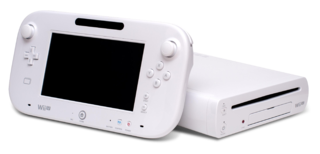Related Research Articles

Notepad++, is a text and source code editor for use with Microsoft Windows. It supports tabbed editing, which allows working with multiple open files in one window. The program's name comes from the C postfix increment operator.

iOS is a mobile operating system developed by Apple exclusively for its smartphones. It was unveiled in January 2007 for the first-generation iPhone, which launched in June 2007. Major versions of iOS are released annually; the current stable version, iOS 18, was released to the public on September 16, 2024.
iOS is a mobile operating system developed by Apple Inc. and was first released as iPhone OS in June 2007, coinciding with the launch of the first generation iPhone. iPhone OS was renamed iOS following the release of the iPad, starting with iOS 4. With iOS 13, Apple began offering a separate operating system, iPadOS, for the iPad. iOS is also the foundation of the newer audioOS and tvOS, and shares some of its code with macOS. New iOS versions are released yearly, alongside new iPhone models. From the launch of the iPhone in 2007 until the launch of iPhone 4 in 2010, this occurred in June or July; since then, new major versions are usually released in September, with the exception of iOS 5, which released in October 2011. Since the launch of the iPhone in June 2007, there have been 18 major releases of iOS, with the current major version being iOS 18, released on September 16, 2024.

The iPad is a brand of iOS- and iPadOS-based tablet computers that are developed and marketed by Apple. The first-generation iPad was introduced on January 27, 2010. Since then, the iPad product line has been expanded to include the smaller iPad Mini, the lighter and thinner iPad Air, and the flagship iPad Pro models. As of 2022, over 670 million iPads have been sold, making Apple the largest vendor of tablet computers. Due to its popularity, the term "iPad" is sometimes used as a generic name for tablet computers.

The Wii U is a home video game console developed by Nintendo as the successor to the Wii. Released in late 2012, it is the first eighth-generation video game console and competed with Microsoft's Xbox One and Sony's PlayStation 4.

Apple silicon refers to a series of system on a chip (SoC) and system in a package (SiP) processors designed by Apple Inc., mainly using the ARM architecture. They are the basis of Mac, iPhone, iPad, Apple TV, Apple Watch, AirPods, AirTag, HomePod, and Apple Vision Pro devices.

iPadOS is a mobile operating system developed by Apple Inc. for its iPad line of tablet computers. It was given a name distinct from iOS, the operating system used by Apple's iPhones to reflect the diverging features of the two product lines, such as multitasking. It was introduced as iPadOS 13, reflecting its status as the successor to iOS 12 for the iPad, and first released to the public on September 24, 2019. Major versions of iPadOS are released annually; the current stable version, iPadOS 18, was released to the public on September 16, 2024.
The iPad Mini is a line of small tablet computers developed and marketed by Apple Inc. It is a sub-series of the iPad line of tablets, with screen sizes of 7.9 inches and 8.3 inches. The first-generation iPad Mini was announced on October 23, 2012, and was released on November 2, 2012, in nearly all of Apple's markets. It featured similar internal specifications to the iPad 2, including its display resolution.
OnePlus Technology (Shenzhen) Co., Ltd., doing business as OnePlus, is a Chinese consumer electronics manufacturer headquartered in Shenzhen, Guangdong, China. It was a subsidiary of BBK Electronics, a company which also had Oppo.
The Apple A8 is a 64-bit ARM-based system on a chip (SoC) designed by Apple Inc., part of the Apple silicon series, It first appeared in the iPhone 6 and iPhone 6 Plus, which were introduced on September 9, 2014. Apple states that it has 25% more CPU performance and 50% more graphics performance while drawing only 50% of the power of its predecessor, the Apple A7. The latest software updates for the 1.1GHz and 1.4GHz variants systems using this chip are iOS 12.5.7, released on January 23, 2023 as they were discontinued with the release of iOS 13 in 2019, and 1.5 GHz variant for the iPad Mini 4 is iPadOS 15.8.2, released on March 5, 2024 as it was discontinued with the release of iPadOS 16 in 2022, while updates for the 1.5 GHz variant continue for Apple TV HD. The A8 chip was discontinued on October 18, 2022, following the discontinuation of the Apple TV HD.

The Apple A8X is a 64-bit ARM-based system on a chip (SoC) designed by Apple Inc., part of the Apple silicon series, and manufactured by TSMC. It was introduced with and only used in the iPad Air 2, which was announced on October 16, 2014. It is a variant of the A8 inside the iPhone 6 family of smartphones and Apple states that it has 40% more CPU performance and 2.5 times the graphics performance of its predecessor, the Apple A7. The latest software update for the iPad Air 2 using this chip is iPadOS 15.8.3, released on March 5, 2024, as it was discontinued with the release of iPadOS 16 in 2022 due to hardware limitations of the A8X.

The Apple A9X is a 64-bit ARM architecture-based system on a chip (SoC) designed by Apple Inc., part of the Apple silicon series. It first appeared in the iPad Pro, which was announced on September 9, 2015 and was released on November 11, 2015. The A9X has the M9 motion coprocessor embedded in it, something not seen in previous chip generations. It is a variant of the A9 and Apple claims that it has 80% more CPU performance and twice the GPU performance of its predecessor, the A8X.

The Apple A10 Fusion is a 64-bit ARM-based system on a chip (SoC) designed by Apple Inc., part of the Apple silicon series, and manufactured by TSMC. It first appeared in the iPhone 7 and 7 Plus which were introduced on September 7, 2016, and is used in the sixth generation iPad, seventh generation iPad, and seventh generation iPod Touch. The A10 is the first Apple-designed quad-core SoC, with two high-performance cores and two energy-efficient cores. Apple states that it has 40% greater CPU performance and 50% greater graphics performance compared to its predecessor, the Apple A9. The Apple T2 chip is based on the A10. On May 10, 2022, the iPod Touch 7th generation was discontinued, ending production of A10 Fusion chips. The latest software updates for the iPhone 7 & 7 Plus including the iPod Touch 7th generation variants systems using this chip are iOS 15.8.3, released on July 29, 2024, as they were discontinued with the release of iOS 16 in 2022, while updates for the iPad 7th generation variant systems using this chip are still supported.

iPadOS 15 is the third major release of the iPadOS operating system developed by Apple for its iPad line of tablet computers. The successor to iPadOS 14, it was announced at the company's Worldwide Developers Conference (WWDC) on June 7, 2021 along with iOS 15, macOS Monterey, watchOS 8, and tvOS 15. It was released to the public on September 20, 2021. It was succeeded by iPadOS 16, which was released on October 24, 2022.

The Apple A15 Bionic is a 64-bit ARM-based system on a chip (SoC) designed by Apple Inc., part of the Apple silicon series. It is used in the iPhone 13 and 13 Mini, iPhone 13 Pro and 13 Pro Max, iPad Mini, iPhone SE, iPhone 14 and 14 Plus and Apple TV 4K.

iOS 16 is the sixteenth major release of Apple's iOS mobile operating system for the iPhone. It is the successor of iOS 15, and was announced at the company's Worldwide Developers Conference (WWDC) on June 6, 2022, alongside iPadOS 16, and released on September 13, 2022. It was succeeded by iOS 17 on September 18, 2023.

iPadOS 16 is the fourth major release of the iPadOS operating system developed by Apple for its iPad line of tablet computers. The successor to iPadOS 15, it was announced at the company's Worldwide Developers Conference (WWDC) on June 6, 2022, along with iOS 16, macOS Ventura, watchOS 9, and tvOS 16. It received numerous new features, improving multitasking and many other aspects of the operating system, most notably on iPads with Apple's M1 SoC and later.
References
- ↑ "OnePlus Pad 2". GSMArena. 17 July 2024. Retrieved 17 July 2024.
- ↑ "OnePlus Pad 2 - Specs". OnePlus . 16 July 2024. Retrieved 17 July 2024.
- ↑ Barranger, Kellen (16 July 2024). "OnePlus Pad 2 and Watch 2R Official at $549 and $229". Droid-Life . Retrieved 17 July 2024.